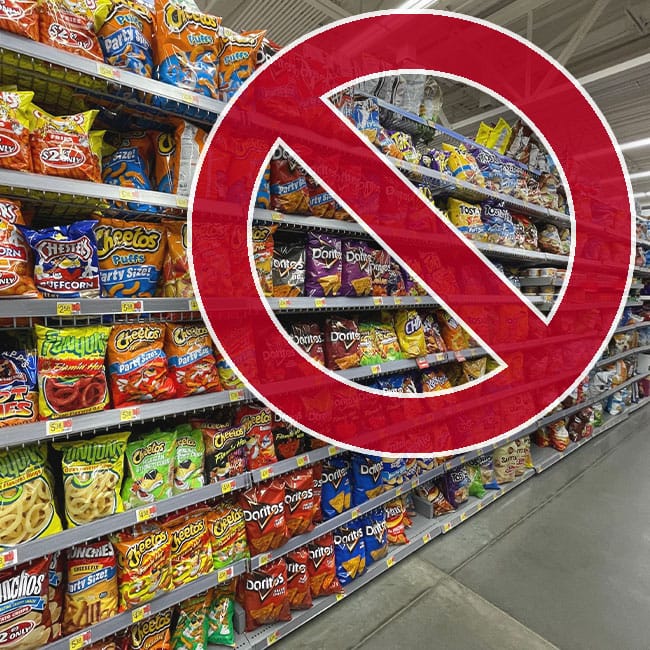One of the most important factors when it comes to weight loss is your metabolism. A faster metabolism will naturally help your body to burn more fat and increase your calorie deficit. Meanwhile, a slower metabolism will store more calories as fat, prompting weight gain. While your metabolic rate is determined by a number of things, from genetics to physical activity to age, the food and drinks you have also play a major role. To learn more about foods that slow metabolism, we spoke with registered dietitians Jesse Feder, CPT at Strength Warehouse and Trista Best, MPH at Balance One. They said there are four main foods that are the worst for your metabolism: sugary cereals, fast food, muffins, and frozen dinners. Read on to learn more!


Sugary cereals
Although cereals are one of the easiest breakfast options to start your day, they're generally low in any valuable nutrients. Most cereals are also packed with sugar which can be detrimental to your metabolism. Feder says sugary cereals are "one of the most unhealthy processed foods you can have." The added sugars have no nutritional value and result in empty calories that ruin your metabolism.
"They are loaded with sugar, sodium, and refined carbohydrates," he continues. "These things, when eaten in high amounts and consistently, can lead to obesity, high blood pressure, diabetes, and heart disease. The highly processed and refined ingredients typically give you a jolt of energy since they are able to be digested very quickly. This then causes a crash in our blood sugar, and can slow your metabolism." So while dietitians like Feder warn against sugary cereals, you don't have to forgo a sweet treat in the morning. Instead, overnight oats. with maple syrup or peanut butter for sweet natural flavoring, are a great breakfast that doesn't affect your blood sugar and will actually keep you full for hours.

Fast food
Fast food, like french fries, burgers, pizza and so much more, is super convenient. This kind of food unsurprisingly poses a significant threat to your metabolism when consumed regularly. This is because of the unhealthy ingredients often found in fast food (which also happens to be why it tastes as good as it does!).
Feder warns against eating fast food meals on the regular. "Fast food meals are made with high amounts of fat, sodium, and unhealthy oils. This can also lead to weight gain, obesity, cardiovascular disease, heart disease, and stroke to name a few things," he says. "The ingredients in fast food meals are also highly processed and refined which can be digested quickly and leave you with a decreased metabolism." One of the best easy to give in to temptation with fast food is meal prepping. That way, you already have your food for the day planned out. Feder emphasizes though that it's still okay to enjoy the occasional McDonald's burger or fries–just don't make it a habit!

Muffins
While it may be appealing to just grab a muffin and run out the door, this tasty treat actually does very little to satiate your appetite and can ruin your metabolism. "Not all muffins are created equal and most are just chock full of refined carbohydrates, sugar, and fat. While there are some versions of muffins that can help you in your health goals this is unfortunately not the case for the most popular," Best says. Similar to cereals, you don't want to start your day with a meal that will only temporarily give you a boost of energy.
Although there are healthy muffins, like oat or bran, the tasty chocolate chip and blueberry ones are (unfortunately) usually full of sugar and refined carbs. They don't actually nourish your body or provide any real benefit to your health."The ingredients list for a muffin typically includes flour, water, eggs, butter, and sugar along with chocolate chips and maybe blueberries. Eggs and blueberries are the two healthiest ingredients, but when paired with the other calorie-dense foods on the list their nutrient quality is essentially negated," Best explains.

Frozen dinners
Many frozen dinners are packed with refined carbs, sugar, and trans fats that will do very little to improve your health or keep you satiated for long. Feder says that frozen dinners usually have "large amounts of fat and salt in them to make them taste good as well as keep them preserved. High amounts of fat and salt can lead to weight gain, obesity, high blood pressure, and cardiovascular disease." So, look for microwave meals that have veggies and a solid protein source. To lose weight, give your body energy, and get a faster metabolism, you must eat a diverse diet rich in macro and micronutrients. It's important to avoid foods like sugary cereals, fast food, muffins, and frozen dinner because they slow down metabolism. Instead, try some of the healthy alternatives listed above. Your body will thank you!


























